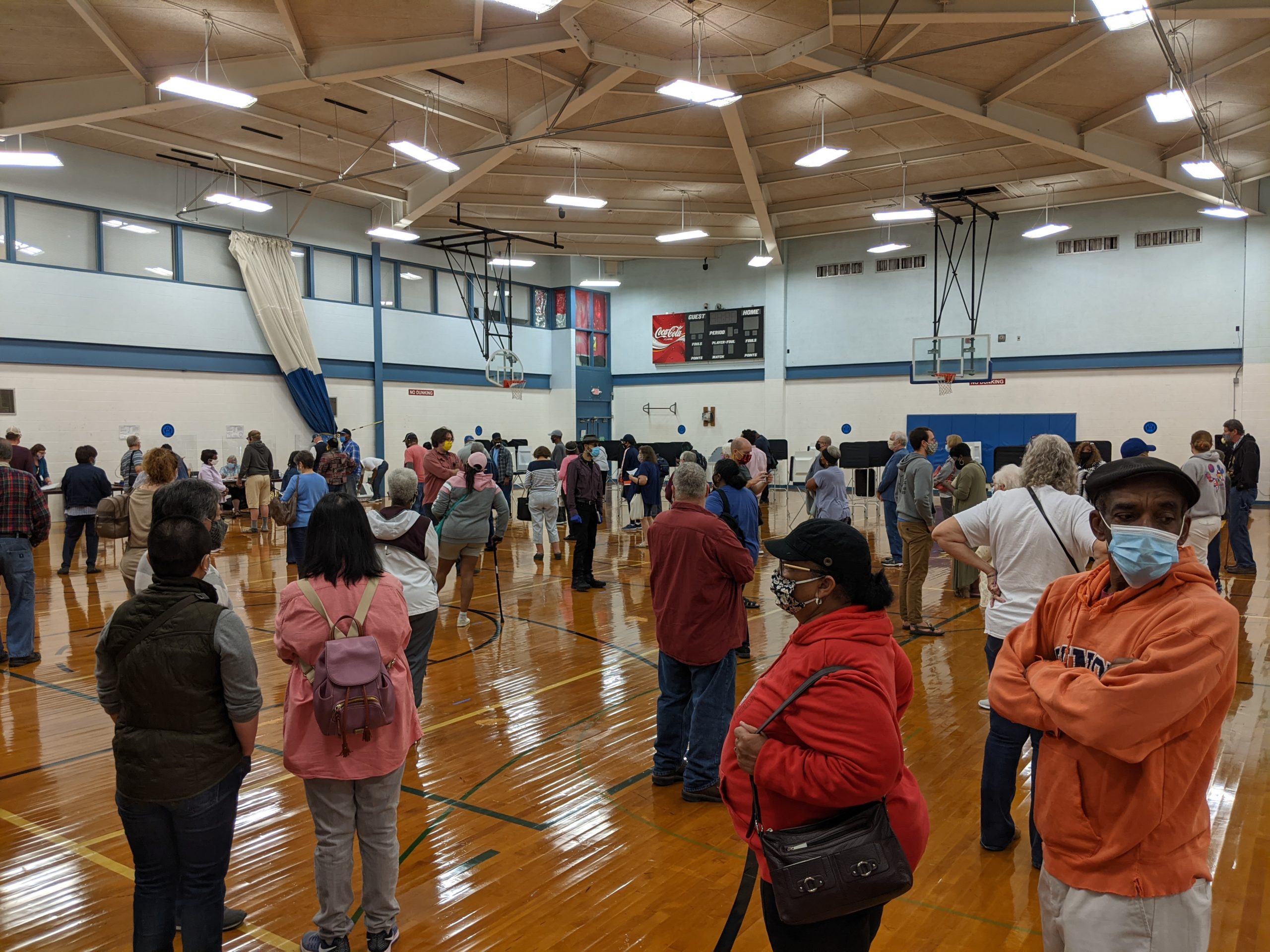
Polls have been open for early voting for about 45 minutes. The room is pretty full, but everybody is masked and keeping proper social distance.


Polls have been open for early voting for about 45 minutes. The room is pretty full, but everybody is masked and keeping proper social distance.
I have written my congressman:
Dear Congressman Davis:
I am writing to urge you to support the United States Postal Service—both in general, and on an emergency basis.
The internet, email, and courier services all have their place, but the U.S. mail remains a critical service. It is used by many businesses and many individuals. Services only available from the post office (such as dated postmarks, and the presumption that something mailed has been delivered) are embedded into laws and common practices beyond counting.
On an emergency basis, the post office needs financial support similar to any business hard-hit by the pandemic.
On a longer-term basis, the post office needs relief from the onerous pension pre-funding rules imposed in 2006. (Or, if those rules are really a good idea, perhaps they should be extended to all businesses, and all local, state, and federal pensions.)
I remind you that the establishment of post offices is one of Congress’s enumerated powers, and urge you to work within Congress to ensure that the post office is preserved. Please let me know about the efforts you’re making.
Yours sincerely,
Philip M. Brewer
I wrote the letter, printed it out on paper, signed it, addressed an envelope, put a stamp on it, and dropped it in the outgoing mail. (I used t-rex stamps, which are really too good for Congressmen Davis, but I was trying to make a point.)
“I managed to walk to the North Pole, but I didn’t manage to walk to the airport from Boston.”
Source: In a fast-paced world, walking is a ‘radical’ act, says Norwegian explorer | CBC Radio
As best I can recall I’ve never linked to—maybe never even read—an article in Out magazine, but this one speaks to me:
Do you remember where you were the day you learned 2020 hopeful and white man John Delaney is unexpectedly swole? —John Delaney, a White Man Running for President, Is Weirdly Jacked
I can kinda understand the 0.1% (with secure bunkers on high ground) talking down climate change. But what’s up with ordinary people living near a coast? How are they not demanding urgent action?
I marvel that the 1% is being so indifferent to the large and widening leftward political shift in the U.S. and elsewhere. It seems to me they should have already started telling their politicians, “Give the poor folks 20% of what they want, quick! We need to nip this in the bud!”
Of course, maybe they’re right and I’m wrong.
They got away with globalization, after all. And then they got away with the financial crisis. And so far they’ve gotten away with Trump’s tax cut.
Now, I can understand the first two. Globalization, despite how it crushed many individuals, families, and communities, did make people better off on average. Having the average person end up better off makes a policy supportable at some level. I can see it providing enough political cover for them to get away with it. Who doesn’t like buying cheap crap at WalMart? Nobody but freaks and weirdos like me.
The financial crisis is harder to understand, which I think is due mainly to it being harder to understand. There was a real sense that our whole economy could implode—and it was a real sense because it was actually true. The technocrats managed to save the economy, so they get some credit for that. They did it in a way that crushed homeowners, which is bad. They did it in a way that subverted the rule of law, which is bad. And they did it in a way that crushed a whole generation, which is also bad. But they did save the economy.
But now we’ve got multiple cohorts of people who have already turned against the system. It’s no longer just the freaks and weirdos who care about their local community and the natural systems that support life. It’s no longer just former homeowners whose homes were seized to save the banks. It’s no longer just millennials who graduated into a job market so bad that they’re a decade behind their parents’ generation in things like family formation (and further than that in preparing to retire).
Now it’s basically everybody except the 1% who is being harmed, and they’re being harmed right now, every day.
The Trump tax cut is just a naked grab at wealth by the wealthy. It didn’t help anybody else. Trump’s tariffs aren’t even that—they don’t help anything but Trump’s ego.
I cannot imagine that any amount of voter suppression and gerrymandering—even with the structural anti-democratic features of our constitution—will keep the supermajority of people being harmed by our current system from making some major changes.
If the 1% had any sense they’d have thrown some bones to the people already. I can’t imagine that the smart ones haven’t figured this out already.
Sure, there are plenty of dumb ones who figure that they can build a survival bunker in Alaska or New Zealand and survive the ensuing revolution and climate catastrophe. But are they really all that dumb?
Evidence so far suggests they are.
Or maybe they’re right and I’m wrong.

After being briefly disappointed that the blue wave didn’t materialize as strongly as I’d hoped, I find that I am nevertheless rather hopeful about the future of our democracy.
This hopefulness springs from two causes. First, there are already more Democratic voters than there are Republican. Second, the Fifteenth Amendment is already part of the constitution.
The number of votes cast for a Democratic House candidate exceeded the number cast for a Republican House candidate by well in excess of 4 million votes. We’re already in the majority by several percentage points.
The reasons we don’t already control the levers of power are well understood. The Constitution, through the Senate and the Electoral College, give excess power to small states which currently lean Republican. The Republicans have been more shameless about gerrymandering. Voter suppression efforts targeted at ethnic minorities and at the young have been effective at reducing votes for Democrats.
Even if all of those things stay the same, we’re still a majority, and over time that will win out.
We will probably take control even before time (and demographic changes) bring us to that point. All it will take is a leader charismatic enough to produce some modest coattails, and we’ll once again have a Democratic government.
Once that happens, I very much hope, the Democrats will seize the opportunity to put an end to the gerrymandering and the voter suppression. That will put and end to the power of the racist wing of the Republican party, even if the Senate and the Electoral College remain unreformed.
How can that be done? Through the Fifteenth Amendment.
Under the Fifteenth amendment, Congress has the power to enact appropriate legislation to ensure that “The right of citizens of the United States to vote shall not be denied or abridged by the United States or by any State on account of race, color, or previous condition of servitude.”
The Supreme Court struck down some of the rules enacted to do that, thereby enabling the recent spike in voter suppression. But the Supreme Court did not rule in favor of voter suppression. Rather, its decision turned rather narrowly on the “appropriate” part of the Congress’s power to legislate on the topic.
Supposedly, once the law had been in force for decades, it got too easy for Congress to just extend it, without doing the analysis to justify its appropriateness. Along those lines, the fact that the law treated some states (those that tried to suppress minority votes) differently from other states (those that did not) “despite our historic tradition that all the States enjoy equal sovereignty” was something the court objected to.
These things can be easily fixed. Congress can do the analysis to justify a long list of required and prohibited practices, and can apply those rules to all the states equally.
If we were a minority, the way the Republicans are, I’d be very worried. If we lacked a Fifteenth amendment, and had to fix this state-by-state, I’d be modestly worried.
As it is, I’m not so much worried as I am annoyed by what we’re having to go through at the moment.
Of course, I felt many of the same hopes back in 2012, and look where we ended up. No wonder some people think I’m a hopeless optimist.
I am very sad to find myself in a country where a large fraction of the people (and an actual majority of the elected leaders) are willing to tolerate literal treason, just to live in a world where they don’t have to respect other people.
Don’t want to brag, but I totally called it on a nuclear North Korea way back in 2003 (except that I’m surprised W is dodging the blame):